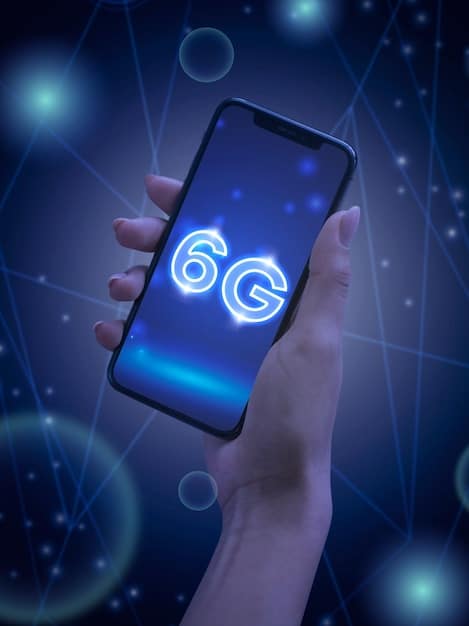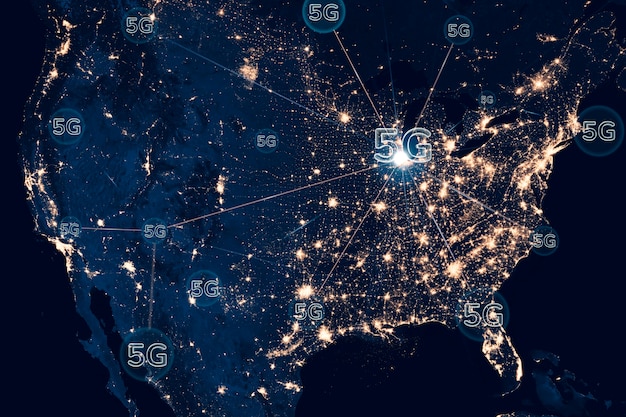The Impact of 5G on Mobile Marketing: Opportunities and Challenges in the US

5G technology is revolutionizing mobile marketing in the US, offering unprecedented opportunities for faster data speeds and enhanced customer experiences, while also posing challenges such as infrastructure limitations and privacy concerns for businesses.
The advent of the impact of 5G on mobile marketing: opportunities and challenges for US businesses is poised to revolutionize how companies connect with their audiences, providing unparalleled speed and connectivity, transforming user experiences and offering innovative ways to engage consumers. This technological shift, however, presents both exciting opportunities and significant challenges for marketers across the United States.
Understanding 5G Technology and its Capabilities
5G, the fifth-generation technology standard for cellular networks, represents a significant leap from its predecessor, 4G. It promises not just faster speeds but also lower latency and greater network capacity, enabling a host of new applications and services.
Key Features of 5G
5G is not just about speed; it encompasses a range of features that differentiate it from previous generations. Understanding these features is crucial for businesses looking to leverage 5G in their mobile marketing strategies.
- Enhanced Mobile Broadband (eMBB): Offers significantly faster data speeds, supporting high-resolution video streaming and immersive experiences.
- Ultra-Reliable Low Latency Communications (URLLC): Provides ultra-low latency, critical for applications like augmented reality (AR) and virtual reality (VR) where real-time responsiveness is essential.
- Massive Machine-Type Communications (mMTC): Supports a massive number of connected devices, facilitating the Internet of Things (IoT) and enabling smarter, more connected marketing campaigns.
These features of 5G open up possibilities for marketers to create engaging, personalized, and real-time experiences that were previously unattainable.

Opportunities for Mobile Marketing with 5G
5G’s capabilities unlock a wide array of opportunities for mobile marketers to enhance their strategies and reach consumers in new and engaging ways. From immersive experiences to personalized content delivery, the possibilities are vast.
Enhanced Customer Experiences
5G enables marketers to deliver enhanced customer experiences that are more immersive, interactive, and personalized. This can lead to increased engagement and brand loyalty.
- Augmented Reality (AR) and Virtual Reality (VR) Marketing: Create immersive experiences that allow customers to virtually try products, explore destinations, and engage with brands in new ways.
- Interactive Video Content: Deliver high-resolution, interactive video content that keeps customers engaged and entertained.
- Personalized Content Delivery: Utilize 5G’s speed and capacity to deliver personalized content in real-time based on customer preferences and behaviors.
By leveraging 5G to create more engaging and personalized experiences, marketers can build stronger relationships with their customers and drive conversions.
Challenges for US Businesses Adopting 5G Mobile Marketing
While 5G presents numerous opportunities, US businesses must also be aware of the challenges that come with adopting this technology for mobile marketing. Overcoming these challenges is essential for realizing the full potential of 5G.
Infrastructure Limitations
The rollout of 5G infrastructure across the United States is still ongoing, and coverage is not yet universal. This limitation can impact the reach and effectiveness of 5G-based mobile marketing campaigns.
Cost of Implementation
Implementing 5G technology requires significant investment in infrastructure and devices. This cost can be a barrier for small and medium-sized businesses (SMBs) looking to adopt 5G mobile marketing.
Addressing these challenges requires careful planning, strategic partnerships, and a willingness to invest in the necessary infrastructure and expertise.

Strategies for Leveraging 5G in Mobile Marketing
To effectively leverage 5G in mobile marketing, US businesses need to develop targeted strategies that align with their overall marketing objectives, focusing on enhancing customer engagement and streamlining operations.
Personalized Marketing Campaigns
Utilize 5G’s high data speeds to deliver personalized marketing messages. Analyze data to understand customer preferences and buying behaviors, leading to more effective engagement.
- Dynamic Content Optimization: Create campaigns that adapt in real-time based on user behavior and preferences.
- Location-Based Marketing: Leverage 5G for precise location targeting, enhancing local marketing efforts.
By personalizing marketing efforts, businesses can improve customer experience and boost conversion rates.
The Future of Mobile Marketing with 5G
The future of mobile marketing with 5G is exciting and full of potential. As the technology continues to evolve and become more widespread, new opportunities will emerge for businesses to connect with their customers in innovative ways.
Predictions for 5G Mobile Marketing
Here are a few predictions for the future of mobile marketing with 5G:
With advancements in 5G technology, mobile marketing is set to become more intuitive, personalized, and seamless.
- AI Integration: Enhanced automation through AI, creating highly targeted marketing campaigns. Personalized recommendations and dynamic content will revolutionize consumer engagement.
- Edge Computing Adoption: With 5G and edge computing, mobile marketers will be able to place computing resources closer to users, reducing latency and improving the performance of applications like AR and VR.
Embracing these changes will be vital for US businesses looking to stay ahead in the mobile marketing landscape.
Measuring the Success of 5G Mobile Marketing Campaigns
Measuring the success of 5G mobile marketing campaigns is essential for understanding their effectiveness and driving continuous improvement. Businesses need to track key performance indicators (KPIs) and use data-driven insights to optimize their strategies.
Key Performance Indicators (KPIs)
Here are some important KPIs to track for 5G mobile marketing campaigns:
- Engagement Rate: Measures the level of interaction with your content, including likes, shares, and comments.
- Conversion Rate: Tracks the percentage of users who complete a desired action, such as making a purchase or filling out a form.
- Customer Lifetime Value (CLTV): Assesses the long-term value of customers acquired through 5G mobile marketing.
By analyzing these KPIs, businesses can gain valuable insights into the performance of their campaigns and make data-driven decisions to improve their results.
| Key Point | Brief Description |
|---|---|
| 🚀 Faster Speeds | 5G offers significantly faster data speeds compared to 4G, enhancing user experience. |
| 📱 Enhanced Experiences | 5G enables AR/VR marketing, creating immersive customer engagements. |
| 🚧 Implementation Challenges | Businesses face infrastructure limitations and costs in deploying 5G. |
| 🎯 Personalized Campaigns | Targeted, data-driven campaigns improve customer experience and conversion rates. |
Frequently Asked Questions about 5G and Mobile Marketing
▼
5G enhances mobile marketing by offering faster data speeds, lower latency, and greater network capacity, enabling more immersive and personalized customer experiences.
▼
Challenges include the ongoing rollout of 5G infrastructure, uneven coverage across the US, and the significant costs associated with implementing 5G technology.
▼
Businesses can measure success by tracking key performance indicators (KPIs) such as engagement rate, conversion rate, click-through rate, and customer lifetime value (CLTV).
▼
AI enhances 5G mobile marketing by enabling automation, personalized content delivery, and highly targeted campaigns, which lead to improved customer engagement and ROI.
▼
5G will unlock opportunities such as advanced augmented reality (AR) and virtual reality (VR) experiences, edge computing for faster delivery, and enhanced Internet of Things (IoT) integration.
Conclusion
In conclusion, 5G presents transformative opportunities for mobile marketing in the US, enabling enhanced customer experiences and personalized campaigns. While challenges like infrastructure limitations and implementation costs exist, strategic planning and innovative approaches will allow businesses to fully leverage 5G’s potential, driving growth and customer engagement in the evolving digital landscape.





